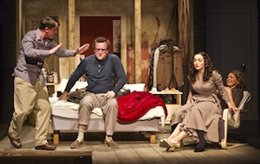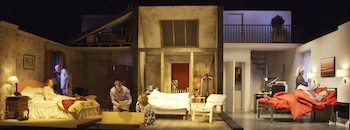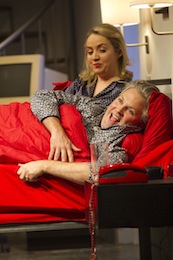 Alan Ayckbourn’s Bedroom Farce has acquired the patina of more than 35 years, although this and others of the prolific playwright’s comedies (like Absurd Personal Singular and The Norman Conquests) became canonical on first outing. Bedroom Farce, succinctly described in promotional material thus - “three bedrooms, four couples” - gets away with having a generic as its title, and delivers what one might expect. Except it isn’t really a bedroom farce. There are no lecherous old men, no disguises or mistaken identities, and, although there is a wardrobe onstage, no one leaps out of it at any point. This is wholesome comedy in which there is but one illicit kiss, and the man immobilised by back spasm was not cavorting in bed when struck down. The plot is propelled by this one minor fidelity blip which affects all four pairs in different ways. As different as the couples are, we suspect that, like the older Ernest and Delia, they would all be far happier, in the end, eating pilchards on toast in bed with their respective spouses. Accordingly, Peter O’Brien de-sexes the participants from the start by providing variations on flannel jammies, grannie nightgowns, a lot of towelling and even white y-fronts. Kitted out like this most women look harmlessly adorable, most men just silly, which is exactly where we want to be. James McConnell’s choice of bright, unfussy lighting complements script, production, costumes and sets – these people have little to hide, and we will be seeing them at their worst.
Alan Ayckbourn’s Bedroom Farce has acquired the patina of more than 35 years, although this and others of the prolific playwright’s comedies (like Absurd Personal Singular and The Norman Conquests) became canonical on first outing. Bedroom Farce, succinctly described in promotional material thus - “three bedrooms, four couples” - gets away with having a generic as its title, and delivers what one might expect. Except it isn’t really a bedroom farce. There are no lecherous old men, no disguises or mistaken identities, and, although there is a wardrobe onstage, no one leaps out of it at any point. This is wholesome comedy in which there is but one illicit kiss, and the man immobilised by back spasm was not cavorting in bed when struck down. The plot is propelled by this one minor fidelity blip which affects all four pairs in different ways. As different as the couples are, we suspect that, like the older Ernest and Delia, they would all be far happier, in the end, eating pilchards on toast in bed with their respective spouses. Accordingly, Peter O’Brien de-sexes the participants from the start by providing variations on flannel jammies, grannie nightgowns, a lot of towelling and even white y-fronts. Kitted out like this most women look harmlessly adorable, most men just silly, which is exactly where we want to be. James McConnell’s choice of bright, unfussy lighting complements script, production, costumes and sets – these people have little to hide, and we will be seeing them at their worst.
Tiresome Trevor (Rory Nolan in a sublimely self-contained bubble of angst) is the pampered son of Ernest and Delia. He should have married practical and bossy Jan, but chose flakey Susannah instead. Trevor and Susannah’s levels of self-absorption are limitless. They spend the night selfishly wreaking havoc upon Malcolm and Kate’s housewarming party, disturbing their elders’ peace of mind further after a disappointing wedding anniversary outing, and increasing the torture levels on Jan’s husband Nick’s spinal column. No one gets a night of sleep, but harmony reigns by morning, even if the flat pack furniture is a disaster.

All this is accomplished in Eileen Diss’s crowded but clever staging, reflecting the couples’ tastes and biographies. The tripartite bedroom scene gives us the flowery démodé cocoon shared by Ernest and Delia with overstuffed attic of memorabilia overhead; the lifetime fixer-upper of Malcolm and Kate, complete with garret-like skylight; and Jan and Nick’s relentlessly tasteful bedroom with mezzanine, which resembles nothing more than an upscale resort hotel with artwork that matches the duvet.
Deirdre Donnelly, as Delia, is implacably the settled matron as she prepares unhurriedly for her anniversary, convinced the table will be held for her as “a regular” in a restaurant she only frequents once a year. Stephen Brennan’s Ernest fears creeping damp wherever he looks in their home of many years, pacing impatiently in black tie during his wife’s toilette. Together they present a totally recognisable and age-appropriate pair, the likes of which we all hope we will never become, and whom we all cherish. Ernest has tantrums when his routine and sleep are upended, but Brennan is docile and compliant in the face of Donnelly’s imperious directives to make himself scarce in the bathroom while she sorts her daughter-in-law and tracks down her errant son.
 Kathy Rose O’Brien, as Jan, and Lorna Quinn (Kate) provide the sparkly blonde pertness required for this level of comedy, the former as hard-headed and dismissive as the latter is blithe. O’Brien displays unshakeable confidence and faulty judgment simultaneously, a difficult balance to maintain. Quinn's radiant presence, along with Garret Lombard as hubby Malcolm, the quintessence of bumbling, brings to mind the indefatigable optimism and devotion of the younger Penelope Keith and Richard Briers in The Good Life, with nods to their missing DIY skills and practical birthday gifts.
Kathy Rose O’Brien, as Jan, and Lorna Quinn (Kate) provide the sparkly blonde pertness required for this level of comedy, the former as hard-headed and dismissive as the latter is blithe. O’Brien displays unshakeable confidence and faulty judgment simultaneously, a difficult balance to maintain. Quinn's radiant presence, along with Garret Lombard as hubby Malcolm, the quintessence of bumbling, brings to mind the indefatigable optimism and devotion of the younger Penelope Keith and Richard Briers in The Good Life, with nods to their missing DIY skills and practical birthday gifts.
Alan Stanford, seasoned director of Wilde and Coward, among other comedic titans, is on comfortable ground here as he deploys his equally reliable comic actors. It is noteworthy that the director performed in this play in the Gate earlier in his career. His production prevents Ayckbourn’s script from ossifying, keeping it fresh for the twenty-first century audience through a judicious balancing of physical comedy and exploration of human foible. Friendship, love and tolerance overcome testiness and exasperation. The action on stage only allows for tedium to creep in during Lovett’s prolonged back agonies. The lack of directorial control here is a slight miscalculation, as Lovett’s physical skills are superior and hilarious, especially as his performance requires never leaving the environs of the bed throughout. In all, Stanford succeeds in presenting this very English comedy of manners for his Irish audience.
Christina Hunt Mahony, who directed the Center for Irish Studies at the Catholic University of America, is Visiting Lecturer in the School of English, Trinity College. She is the editor of Out of History: Essays on the Writings of Sebastian Barry.